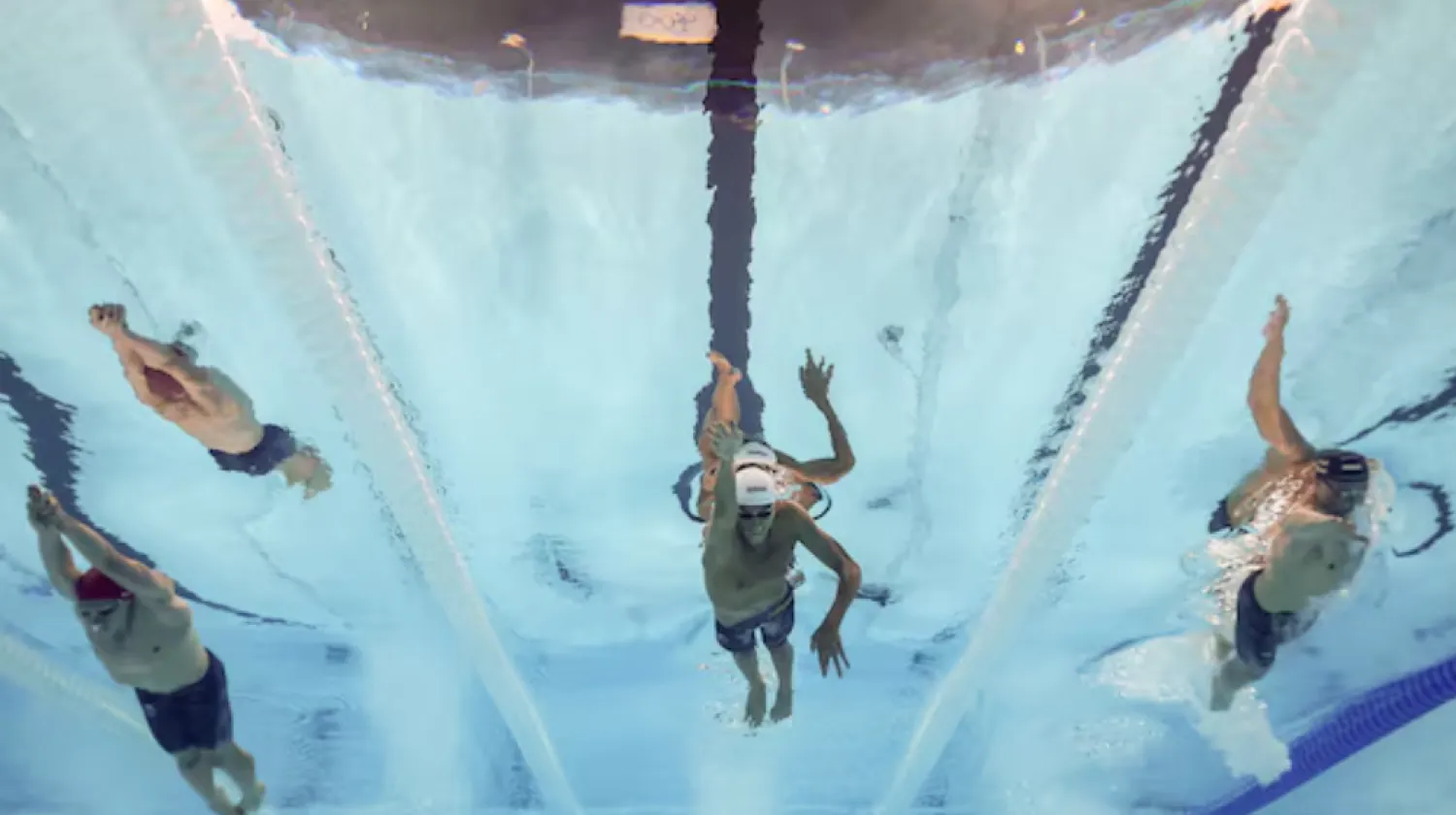The atmosphere for Olympic swimming is electrifying.
The times? Not so much.
Through the first four days of competition in the portable pool at La Defense Arena, no world records were set. It's becoming more and more apparent that a truly extraordinary performance will be required to take down an existing standard, The AP reported.
The culprit for the slower-than-expected times appears to be a pool that is slightly shallower than the optimal depth, which allows a couple of extra rows of prime deck-side seats to remain in use but creates more waves and turbulence rolling up to the surface.
“I’ve heard the rumblings, but at the end of the day we’re here to race,” American star Katie Ledecky said. “We’re all fast swimmers. We make the pool as fast as we want it to be. I’m not really thinking about it.”
Going forward, World Aquatics has mandated a minimum depth of 2.5 meters (8.2 feet) for swimming and water polo events, such as the portable pool that will be installed inside SoFi Stadium for the 2028 Los Angeles Games.
But when the Olympics were awarded to Paris, the temporary facility was approved under previous guidelines that allowed for a depth of 2.2 meters (7.2 feet).
For perspective, a 3-meter (9.8 feet) pool is considered the optimal depth. At the US trials in Indianapolis, where the portable pool installed in Lucas Oil Stadium was around 2.8 meters (9.1 feet), two world records were set.
No complaints about the atmosphere Torin Koos, a spokesman for World Aquatics, noted that five Olympic records were set through the first 15 events at La Defense Arena.
Indeed, no one is griping much. Everyone is competing under the same conditions, so it's not like anyone has an advantage. For the most part, the favored swimmers are coming out on top.
“I try not to pay attention to it just because we’re all in the same pool," said American Katie Grimes, who claimed a silver in the 400-meter individual medley. "I mean, regardless if it’s a slow pool or not, it’s not going to affect just one person. It’s affecting everybody.”
Everyone has raved about the raucous setting, more than 15,000 strong for every session in an indoor stadium that is normally used by the famed rugby club Racing 92. The crowds are loud and boisterous, especially when French star Leon Marchand dives in the water.
“It doesn’t matter whether I’m racing here in in Paris or at a local country pool in South Australia,” Aussie sprinter Kyle Chalmers said. “It’s all about winning that race in the pool. Everyone has the same opportunity. Everyone has a lane. We’re all swimming in the same pool. It’s not like some people are sending their times in from the trials or anything like that.”
Maybe it's the pressure of the moment Chalmers doesn't believe the pool is entirely to blames for the slower-than-expected races.
“There’s a lot of pressure and expectation that people put on themselves,” he said. “A lot of people haven’t swam in the Olympics before. I think the nervous energy of having like (15,000 fans) in the stadium is crazy. I personally love it, but I think people do definitely crack under that pressure.”
Many swimmers are slower at the Olympics Still, the times are a bit jarring.
Summer McIntosh blew away Grimes and the rest of the field in the 400 IM, but the 17-year-old Canadian went more than three seconds slower than her world-record showing at her country's Olympic trials in May.
David Popovici of Romania captured gold in the men's 200 freestyle with a time of 1 minute, 44.72 seconds, the slowest by an Olympic champion in that event since Pieter van den Hoogenband at the 2000 Sydney Games.
Then there's Nicolò Martinenghi of Italy, whose gold-medal time of 59.03 in the 100 breaststroke would not have been good enough to claim a medal of any color at the last two Summer Games. It was the slowest winning performance since Japan's Kosuke Kitajima two decades ago at the Athens Olympics.
A look back at previous Olympics At least one swimming world record has been set at every Olympics in the post-World War II era, and it's common for multiple marks to fall.
A whopping 23 world records were set at the 2008 Beijing Games, when the sport was in the midst of the rubber-suit revolution. The following year, at the world championships in Rome, a staggering 43 marks were established, leading the world governing body to impose strict new rules governing body coverage and fabrics.
Since then, the pace of world records has returned to more customary levels, with several marks from those 2009 worlds still on the books. But it's generally assumed that most everyone will be at their best when an Olympic year rolls around, which usually leads to a spirited assault on the record list.
Nine world records were set at London in 2012, eight more fell at the 2016 Games in Rio de Janeiro, and a half-dozen were broken at the pandemic-delayed Tokyo Games three years ago, when swimmers competed in a mostly empty arena because of COVID-19 restrictions.
The lack of fans hasn't been an issue in Paris, where the cacophony of a large arena filled to the rafters with passionate supporters has given everyone an extra push.
Not quite enough to call for a rewrite to the record book, but Chalmers and others don't really seem to mind.
“It doesn’t matter about times,” the Aussie said. “It’s about getting your hand on the wall first and winning the race. The times are never really all that remembered.”









